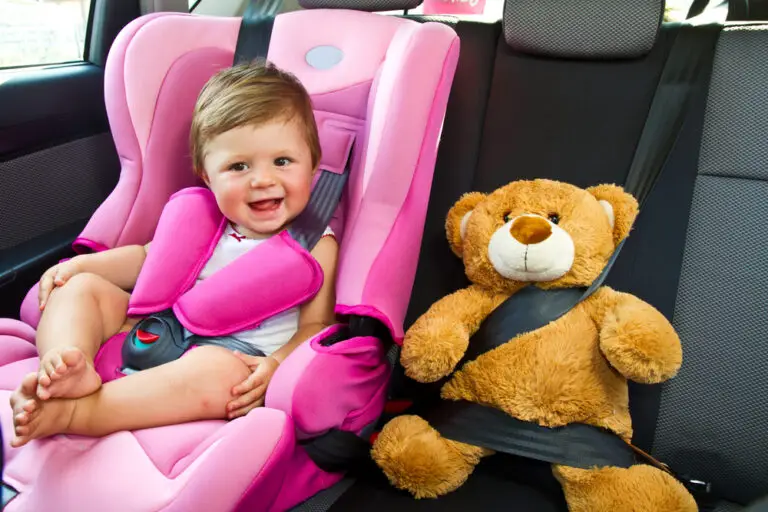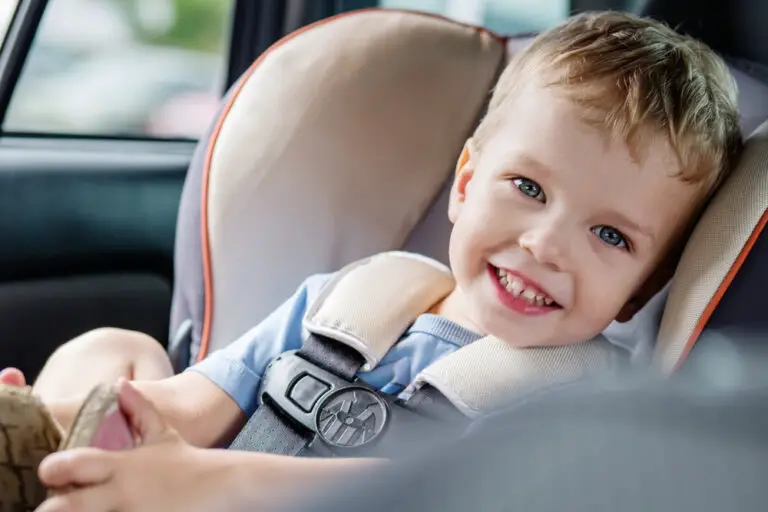West Virginia Car Seat Laws 2024 (Rear, Forward & Booster)

According to the West Virginia car seat laws, a driver must ensure that all children under 8 years of age and shorter than 4 feet and 9 inches are placed in a child restraint system.
The system must meet the applicable federal motor vehicle safety standards. Those children who are at least 4’9” tall can use a safety belt even if they are younger than 8 years.
- WV Rear-Facing Seat Law
- WV Forward-Facing Seat Law
- WV Booster Seat Law
- WV Child Front Seat Law
- WV Child Seat Belt Law
- WV Taxi Child Seat Law
- WV Ridesharing Seat Law
- WV Child Seat Repl. Law
- Leaving Child in Car in WV
- Choosing a Child Seat in WV
- Seat Installation Help in WV
Disclaimer: The content in this article does not constitute legal advice. It is solely for the purpose of providing information. The law is amended from time to time and the information in this article may not always be up to date. We recommend you check the original source of the law.
West Virginia Car Seat Laws
West Virginia Rear-Facing Car Seat Law
There is no specific rear-facing car seat law in West Virginia. (1) The West Virginia state law broadly states that a child under 8 years of age and below the height of 4 feet 9 inches must be restrained in an appropriate child passenger safety system.
However, the West Virginia DMV (WV DMV) recommends that an infant should travel in a rear-facing car seat. (2) It is the smallest seat that can safely transport a baby.
The rear-facing car seat age in West Virginia is not mentioned in the law. But officials recommend that children ride in a rear-facing car seat until the age of 2 years. The car seat must never be placed in front of an active airbag.
If you violate the West Virginia rear-facing child seat law, you can be fined a minimum of $10 and a maximum of $20.
Age: Newborn to 2 years (recommended)
Height: Shorter than 4’9”
Penalty: Minimum $10, and maximum $20.
West Virginia Forward-Facing Car Seat Law
There is no express forward-facing car seat law in West Virginia. (1) But children below 8 years of age and shorter than 4’9” must be placed in a child restraint system that meets federal motor vehicle safety standards.
In the absence of a West Virginia forward-facing child seat law, it is best to follow the guidelines issued by the American Academy of Pediatrics (AAP). Once the child has outgrown the height and weight limit of the rear-facing seat, they can move to a forward-facing car seat.
Though the forward-facing car seat age in West Virginia is not legally stated, the WV DMV recommends that children can ride in a forward-facing seat with a 5-point harness at 2 years old. (2)
Disobeying the law will attract a fine of a minimum of $10 and a maximum of $20.
Age: 2 to 4 years
Height: Shorter than 4’9”
Penalty: Minimum $10, and maximum $20.
West Virginia Booster Seat Law
There is no specific child booster seat law in West Virginia but a general car seat law. (1) A child under 8 years of age and shorter than 4’9” must be placed in a child passenger safety system that meets the federal vehicle safety standards. It includes a high-back as well as a backless booster seat.
Though the booster seat age in West Virginia is not stated in the law, the WV DMV recommends that children stay in them from the ages of 4 to 8. (2) There are no prescribed height or weight limits under the West Virginia booster seat requirements.
However, guidelines recommend that once your child is 4 years old, weighs at least 40 pounds, and is shorter than 4’9”, they should ride in a booster seat.
The penalty for disobeying the law is a fine of a minimum of $10 and a maximum of $20.
Age: 4 to 8 years (recommended)
Height: Shorter than 4’9”
Weight: 40 pounds (recommended)
Penalty: Minimum $10, maximum $20.
West Virginia Child Front Seat Law
Though there is no clear child front seat law in West Virginia, the AAP recommends that children sit in the back seat till at least 13 years of age.
However, if you are carrying them in the front seat, then they must be placed in a child passenger safety system that is appropriate for their height and weight requirements. The passenger-side airbag must be deactivated.
While an explicit front seat age in West Virginia is not mentioned, children standing at least 4’9” tall can ride with a seat belt even if they are younger than 8 years. (1) If you violate any provision of the West Virginia child seat laws, you can be penalized a minimum of $10 and a maximum of $20.
Age: 13 years and older (recommended)
Penalty: Minimum $10, maximum $20.
West Virginia Child Seat Belt Law
According to the child seat belt law in West Virginia, children who are 8 years or older or at least 4’9” tall must wear a seat belt while traveling in a passenger vehicle, van, or pickup truck. (1) Until they are 13 years old, they should sit in the backseat and later move to the front seat.
Under the West Virginia children’s seat belt law, children who are at least 4’9” in height can wear an adult safety belt. It should fit properly over their shoulders and thighs.
You must follow the strict requirements under the seat belt rules in West Virginia. Your child not wearing a seat belt can get you a fine of a minimum of $10 and a maximum of $20.
Moreover, the car seat laws in West Virginia are a primary enforcement law— law enforcement will pull you over if your child is not restrained in an appropriate child seat. (2)
Age: 8 years or older
Height: 4’9” or taller
Penalty: Minimum $10, maximum $20.
West Virginia Taxi Child Seat Law
There is no express taxi child seat law in West Virginia. The law exempts a passenger vehicle operated for hire from having a child passenger safety system in place. (1) This excludes taxis, which are hired vehicles, from the purview of the law.
Though it is not mandatory to have a taxi child seat in West Virginia, we recommend that you follow the best practices. You can refer to the AAP guidelines and NHTSA recommendations to find the best car seats for your child.
In the absence of a clear law, either the taxi driver can provide a car seat, or you can arrange one before taking the child in a taxi. In any case, it is important to keep the child in an appropriate child safety system.
West Virginia Ridesharing Child Seat Law
The ridesharing child seat law in West Virginia is unclear. The child seat requirements in West Virginia state that a “driver” who transports children in a vehicle must have a federally approved child passenger safety system in place. (1)
However, it does not specify who should provide a child seat. Nor does it specify if it applies to ridesharing services such as Uber and Lyft.
In such a scenario, it is recommended that either the parents/caregivers or the driver should provide a child passenger safety system. For infants, it includes a rear-facing car seat.
For toddlers and young children under 8 years and shorter than 4’9”, a forward-facing car seat or a booster seat is required. Children taller than 4’9” or older than 8 years have to wear the adult seat belt.
West Virginia Child Seat Replacement Law
There is no explicit child seat replacement law in West Virginia. In this case, it is best to follow the recommendations made by the NHTSA. If your car is involved in a moderate or severe accident in West Virginia, you must replace the child safety seat.
However, if your vehicle suffered a low-impact accident, there is no need to automatically replace the car seat. A low-impact minor crash is one that satisfies all five conditions prescribed by the NHTSA.
The WV DMV too recommends child seat replacement after an accident. (2) The car seat or booster seat that has been involved in a crash may have defects not visible to the eye. Therefore, it is important to replace them after a moderate or severe crash.
Leaving Child in The Car in West Virginia
There is no law on leaving a child in a vehicle in West Virginia. But leaving a child unattended in a vehicle is dangerous. The most prominent danger is the child suffering from a heat stroke. Children’s bodies heat up more quickly than adults. Hence, heat stroke can significantly endanger their safety. They can also have an in-car accident, set the car in motion if it is running, or be kidnapped.
So even though leaving a child in the car in West Virginia is technically not illegal, you should be very careful. A child must not be left in the car, even for a small duration. The negligent parent/caregiver can be charged with child neglect if the child is found unattended in a motor vehicle.
Choosing a Child Car Seat in West Virginia
When choosing a car seat in West Virginia, it is best to follow the WV DMV recommendations. For children younger than 2 years, a rear-facing infant seat is the best car seat to use in West Virginia.
They are usually designed for babies weighing 20-35 pounds. There are also convertible seats that can be used as rear-facing and later forward-facing seats.
For booster seats, you can either choose a backless or a high-back booster seat. They are used with lap and shoulder seat belts. An all-in-one seat may be the best booster seat to use in West Virginia. It is versatile and can be used for all three types of seats.
Car Seat Installation Help in West Virginia
Installing the car seat can be a complex process, especially if you have not done it before. Therefore, it is important to get a certified child passenger safety (CPS) technician for safe installation.
The WV Governor’s Highway Safety Program (GHSP) is divided into 8 regions. Each of them is CPS certified and has technicians that can assist in child seat installation. It also has a list of CPS seat fitting stations.
Some of the car seat installation resources in West Virginia include:
- Parkersburg Police Department
- Charleston Police Department
- Bridgeport Police Department
- Northern Regional Highway Safety Office, Wheeling Police Department
- Southern Regional Highway Safety Program, Beckley Police Department
West Virginia Car Seat Safety Resources
The following are some of the resources for child passenger safety seats in West Virginia:
- The West Virginia DMV Child Passenger Safety (CPS) Program: It is a part of the Governor’s Highway Safety Program (GHSP) and provides education, training, and car seat installation services.
- West Virginia University Medicine Children’s Injury Prevention and Safety Program: It provides education and car seat assistance and replacement to parents and caregivers.
- Safe Kids West Virginia: Led by the WV Department of Health, Violence and Injury Prevention Program, it provides car seat checkups and safety workshops to prevent injuries to children.
- Huntington Highway Safety Program- Child Passenger Safety: It helps parents and caregivers to get their car seats installed and checked. It also provides training and resources.
FAQ
How long should a child ride in a rear-facing car seat in West Virginia?
There is nothing mentioned directly in the law. But it is recommended that a child should ride in a rear-facing car seat till the age of 2 years.
Can you put a rear-facing car seat in the front seat in West Virginia?
The law does not explicitly prohibit it but it is best to put a rear-facing car seat in the back. If you do put it in front, ensure that the front seat airbag is deactivated.
Can you put a rear-facing car seat in the middle rear seat in West Virginia?
You can put a rear-facing car seat in the middle rear seat but it must fit properly. You must go through the car seat as well as your vehicle’s manuals.
When can a baby face forward in a car seat in West Virginia?
The West Virginia car seat regulations don’t specifically mention anything. But the WV DMV recommends that a baby can face forward once they turn 2 years old.
How old for a booster seat in West Virginia?
The law does not state anything. But the WV DMV recommends that children between 4 to 8 years of age should travel in booster seats.
When to use a backless booster seat in West Virginia?
You can use a backless booster seat only if your vehicle seat has a headrest and the child’s ears are not higher than the seat back.
When can a child sit in the front seat in West Virginia?
There is no specific age. But children older than 8 years or taller than 4’9” can ride with a seat belt. However, it is safe for children under 13 years of age to ride in the backseat.
When can a child sit in the front seat with a booster in West Virginia?
Ideally, children in a booster should ride in the back seat. If necessary, the booster seat can be placed in front but the seat’s airbag must be deactivated.
When can a child stop using a booster seat in West Virginia?
Once the child is 8 years old or taller than 4’9”, they can stop riding in a booster seat and start using the safety belt.
When to switch from 5 point harness to a seat belt in West Virginia?
When the child outgrows the 5-point harness around age 4 and weighs at least 40 pounds, they can switch to wearing a seat belt in a booster seat.
When can a child use a regular seat belt in West Virginia?
When the child turns 8 years old or is at least 4’9” tall (regardless of age), they can use a regular seat belt under the West Virginia law.
Do you need a car seat in a taxi in West Virginia?
Taxis are not covered under the West Virginia car seat law. But it is ideal that the parent/caregiver carry a car seat in a taxi.
Do you need a car seat in a Uber in West Virginia?
The West Virginia law is not clear on this issue. But either the caregiver or the driver should provide a federally approved and appropriate car seat to ensure the child’s safety.
Do you need a car seat in a Lyft in West Virginia?
The law is not unclear on this issue. But either the caregiver or the driver should provide a federally approved and appropriate car seat to ensure the child’s safety.

Rishima Rawat
Rishima Rawat is a lawyer and legal writer with over six years of writing and legal experience. She earned her LLB degree from the West Bengal National University of Juridical Sciences, Kolkata. With a passion for child safety, she’s written extensively about the U.S. car seat laws in ParentingMode. She collaborates with businesses and law firms globally, enhancing their online content. Her insights are also published in legal journals like RGNUL, NLIU, and RMLNLU Law Review. Committed to the cause of education, she has volunteered with IDIA, which helps underprivileged children in India to access legal education. She has also worked with Enhelion Knowledge Ventures, a leading legal ed-tech platform in India that provides students with affordable courses in law. Fluent in English and Hindi with elementary proficiency in Spanish, Rishima combines her legal expertise with a dedication to child safety.






